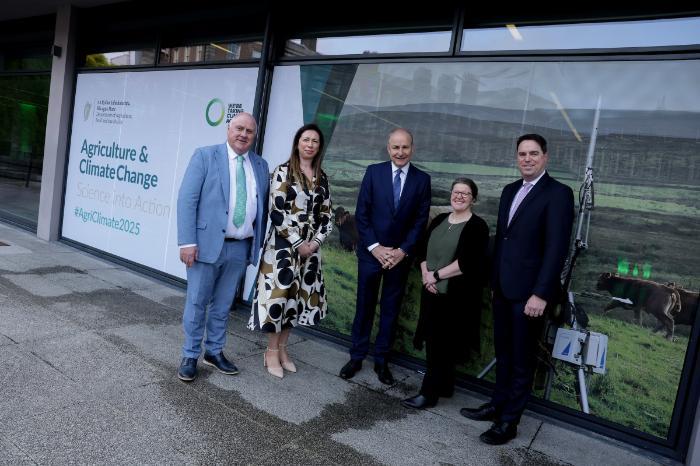05 June 2025
Addressing the intricate relationship between agriculture and climate change
The intricate relationship between agriculture and climate change was addressed by leading international scientists, policymakers and agri-food sector stakeholders at a major conference hosted by the Department of Agriculture, Food and the Marine in Dublin, today, June 5.
“Today’s conference is about building a shared path forward that ensures the next generation of farmers inherits not only a liveable planet but also a thriving, competitive and respected agricultural sector,” Taoiseach Micheál Martin T.D. said during his opening address at the ‘Agriculture and Climate Change: Science into Action’ conference at Dublin Castle.
Noting that the transition to climate-smart agriculture does not need to be a burden, Taoiseach Micheál Martin added: “It is a chance to safeguard what matters most – our land, our water, our food, our planet and our future.
“It is a chance to show that climate action and agricultural excellence can go hand in hand and that Irish farmers can lead the way.”
The conference, hosted by Minister for Agriculture, Food and the Marine, Martin Heydon T.D., and Minister of State with responsibility for research, Noel Grealish T.D., seen 500 delegates hear from national and international scientists on the latest research to reduce agricultural emissions and enhance carbon storage on farms across the country.

L to R: Minister of State with responsibility for Food Promotion, New Markets, Research and Development, Noel Grealish TD; Bridget Lynch, Senior Research Officer, Teagasc; The Taoiseach Micheál Martin; Suzanne Rowe, Principal Scientist, AgResearch New Zealand; Minister for Agriculture, Food and the Marine Martin Heydon TD, attending the ‘Agriculture and Climate Change: Science into Action’ conference at Dublin Castle, 05 June, 2025. Image by Maxwells.
Key research presented at the conference included:
- Animal breeding to reduce methane
- The Department funded ‘ROADMAP’ project has developed one of the largest databases in the world for methane production in animals. This has demonstrated that there is potential to select and breed animals that can produce 10-20% less methane. This is allowing Irish farmers to select bulls for lower methane emissions with no impact on other desirable traits such as animal performance.
- Feed additives to reduce methane
- Research funded by the department is investigating anti-methane feed additives in both indoor settings and delivery mechanisms to outdoor ruminant animals.
- Experiments conducted on a calcium-peroxide-based feed additive known as RumenGlas have demonstrated a potential 10-28% reduction in methane in an indoor setting, depending on the animal type, the diet, and the inclusion rate of the additive.
- In addition, one study conducted in conjunction with the Global Research Alliance demonstrated the potential for both an animal performance benefit (12% higher growth rate and feed conversion efficiency in growing beef cattle) as well as a reduction in methane (-10%) for the first time ever in an Irish setting. This finding will be tested in further studies.
- Biostimulants to reduce chemical nitrogen fertiliser requirements
- Use of an algal-based biostimulant can reduce chemical nitrogen requirement by 20% (in turn reducing emissions) with no impact on grass production or quality.
- Fertiliser formulation to reduce emissions
- Using protected urea can reduce grassland emissions by more than 70%, while nitrification inhibitor products in fertiliser formulations can reduce emissions by 89%.
Leading on climate action
Although numerous research innovations were presented to aid agriculture in reducing its greenhouse gas emissions, Minister Heydon noted that the challenge going forward is to bring these tools into widespread use on Irish farms.
Noting that his department will work with farmers every step of the way in doing so, Minister Heydon added: “Our farmers are innovators and are ready to lead on climate action – not just for Ireland, but as an example to the world.”
He continued: “Reducing emissions from agriculture is a monumental challenge, but one that the sector is taking seriously, evidenced by the huge interest in today’s conference,” Minister Heydon added, before highlighting some of the investments made by his department in the area of agri-climate research:
“Research funding from my Department has supported world-leading agri-climate research in universities, Teagasc and other institutes across the country. In 2023 and 2024, this funding created 132 new research positions in agriculture and climate research across 28 projects. This ensures we have some of the best research talent in the world working on these complex scientific areas.”
Also speaking at the conference, Minister of State Grealish said the event offered an opportunity to take stock of the extensive research taking place to reduce and offset agricultural greenhouse gas emissions, while also recognising the tremendous international collaborations taking place.
“My department alone has invested over €48 million in research in this area since 2020 and we will continue to build on this through awards I will announce later this year arising from the 2025 Thematic Research Call, as well as our involvement in the Global Research Alliance for Agricultural Greenhouse Gases.”
The Agriculture and Climate Change: Science into Action conference took place alongside a meeting of the Global Research Alliance for Agricultural Greenhouse Gases.
